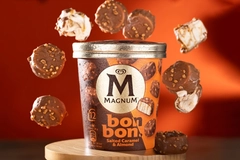Beyond The Headlines: Döhler targets foodservice, Cargill’s novel ice cream concepts
This week in industry news, Döhler expanded its foodservice presence in North America with a freeze-dried fruit range and the EU authorized the use of magnesium L-threonate as a novel food in the region. Meanwhile, Cargill unveiled innovative ice cream prototypes amid consumer demands for elevated flavor experiences and scientists boosted fruit shelf life with an edible biofilm in South Korea.
Launches and research
Döhler partnered with US-based The Perfect Pureé to launch a range of freeze-dried fruit products under the Tastecraft brand in North America to expand its foodservice channel in the region. The freeze-dried fruit range includes seven fruit varieties to leverage as garnish, inclusions, toppings and more for use in restaurant menus. The products help create a fruit garnish or inclusion without the risk of waste or any additional preparation, according to Deb Tatley, account manager, Döhler North America.
Cargill developed a range of innovative ice cream prototypes to meet rising consumer demands. According to its proprietary research, half of all European consumers are seeking elevated ice cream experiences and 58% are eager to try new flavors. The range includes frozen chocolate decadence with a tangy blackcurrant twist and breakfast ice cream bar, combining a crunchy granola-chocolate base, refreshing oat milk sorbet and tangy mango curd, all coated in rich dark cocoa and granola.
 Puratos’ bakery school foundation aims to tackle the shortage of qualified bakers amid rising consumer apetite for baked foods.Food ingredients provider Puratos unveiled its thirteenth bakery school foundation in Ethiopia to mark its 10 year anniversary. The school aims to tackle the shortage of qualified bakers, pastry chefs and chocolatiers in bakeries, restaurants and foodservice providers as consumer appetite for baked goods and chocolate continues to rise globally. The program started in 2014 in Mumbai, India.
Puratos’ bakery school foundation aims to tackle the shortage of qualified bakers amid rising consumer apetite for baked foods.Food ingredients provider Puratos unveiled its thirteenth bakery school foundation in Ethiopia to mark its 10 year anniversary. The school aims to tackle the shortage of qualified bakers, pastry chefs and chocolatiers in bakeries, restaurants and foodservice providers as consumer appetite for baked goods and chocolate continues to rise globally. The program started in 2014 in Mumbai, India.
Researchers in Chungnam National University, South Korea, developed an edible biofilm made from chitosan and gallic acid for extending fruit shelf life, which they say can replace synthetic packaging to offer a sustainable solution to reduce global food waste. The team tested the material’s efficacy on stored mini bananas and cherry tomatoes and observed improved mechanical strength, offering protection against food damage during transportation and improved antioxidant properties.
Business highlights
Finland-based Paulig acquired Dutch brand Conimex from Unilever to expand its presence in the Asian food category in the Netherlands. Conimex manufactures meal makers, prawn crackers, soups, sauces, and seasonings and its acquisition is subject to the merger control clearance by the Dutch competition authority and customary works council consultation procedures.
US-based Post Holdings agreed to take over Potato Products of Idaho, which manufactures and packages refrigerated and frozen potato products. The acquisition includes a manufacturing facility in Rigby, Idaho and, depending on customary closing conditions, it is expected to be completed in the first calendar quarter of 2025, Post’s second quarter of fiscal year 2025. Financial details of the transaction were not disclosed.
Magtein can be used in capsules, RTD beverages, snack bars, gummies, gels and powders.Swiss start-up Yeastup secured an investment worth CHF 8.9 million (US$ 9.9 million) in Series A funding, which it plans to utilize to establish a large-scale production site in Switzerland that can upcycle over 20,000 tons of brewers’ spent yeast annually. The company extracts highly functional ingredients from brewers’ spent yeast using its patented process and isolates high-quality protein and fibers from natural yeast at an industrial scale.
Regulatory highlights
The EU officially authorized the use of magnesium L-threonate as a novel food following an application by North American ingredient supplier AIDP. The product offers a new and highly bioavailable option for magnesium supplementation. Only AIDP, its partner company and licensee ThreoTech, which markets magnesium L-threonate under the trademark Magtein and sublicensees are authorized to market the product in the EU for a period of five years from 7 November 2024 unless a subsequent applicant obtains authorization without reference to the protected proprietary data.


















